Rapid Coronavirus Tests Available in Three Zagreb Locations
November the 3rd, 2020 - Three Zagreb locations have new rapid coronavirus testing possibilities available, and it has been explained precisely who they're intended for as the pandemic rages on in Croatia and across the world.
As Poslovni Dnevnik writes, Sandra Sikic explained that over the past weekend, parallel PCR testing and rapid testing was carried out in parallel.
''The results are good. Antigen tests serve the greatest purpose in the event of the development of respiratory symptoms. If the antigen test comes back negative, that result must then be confirmed with a PCR test. The antigen test can give false negative results and you need to be very careful with that. If the result comes back positive, it is a confirmation that the person is sick, but if it comes back negative, and the person does have symptoms, then that result must be additionally confirmed,'' said Sandra Sikic.
Where will the rapid tests be taken in the aforementioned three Zagreb locations?
''People with symptoms tend to come to the Andrija Stampar Institute, the Dr. Fran Mihaljevic Clinic for Infectious Diseases and the CNIPH through the drive in service. These rapid antigen tests will first be introduced at the Andrija Stampar Institute (Mirogojska), the CNIPH (Rockefellerova) and at the Dr. Fran Mihaljevic Clinic for Infectious Diseases, and they'll only be for people who are displaying symptoms because these people have a a lot of virus in them. Maybe some validation of the test will be done at some point in time, but in the future there will be no need for that,'' said Marija Bubas, the assistant director of the CNIPH.
"Countries still only accept negative PCR test results in order to cross borders because those tests also detect asymptomatic cases," she explained.
"At the Zagreb Fair (Velesajam), we're going to continue to accept people for PCR tests. I'd like to invite people who have symptoms to report to the above two locations, namely Mirogojska and Rockefellerova, because the rapid antigen tests will be undertaken there. If the test returns a negative result, it will be done from the same sample PCR test. So, it won't be necessary to come to do a PCR test if someone is negative.
People will not get their results right away but will get them in the mail. A referral will be available and a price for thar will be formed. HZZO is a key interlocutor. Now they will be able to do this test based on these referrals that they have. When the price is formed, it will be possible to pay for it,'' Bubas told HRT.
For the latest travel info, bookmark our main travel info article, which is updated daily.
Read the Croatian Travel Update in your language - now available in 24 languages
How Has Croatian Economic Crisis Affected Valamar Riviera's Business?
November the 3rd, 2020 - Just how has the ongoing Croatian economic crisis caused by the coronavirus pandemic affected one of Croatia's largest and most successful companies? There's a mixed bag of results.
As Novac writes, during the first three quarters of 2020, Valamar Riviera, the largest Croatian tourist company, generated 2.2 million overnight stays and total revenues in the amount of HRK 673 million, equal to 33 percent of the previous year's revenues.
At the level of the business year, Valamar Riviera expects to make a net loss, but also achieve a positive cash flow with an operating profit in the range of HRK 100 to 115 million. Valamar emphasises that they have been actively managing the situation caused by the Croatian economic crisis and the balance with the enfeebled tourist season since the very beginning of the pandemic. In March alone, the decision to pay a dividend for 2019 was revoked, members of the Supervisory Board waived their fees, and management gave up around 30 percent of salaries.
There was no contagion in their hotels
In parallel with austerity measures and increased liquidity, Valamar actively prepared for the season and modified its products and services to welcome guests safely and securely. This season, 24 hotels and resorts were opened, as well as all 15 camping resorts in eight Adriatic destinations, which employed more than 4,400 employees. Although the tourist season started at the end of June and during July, travel restrictions to Croatia caused a sharp decline in the second part of August and during the off-season. However, since the beginning of the pandemic, almost 300,000 guests have stayed in Valamar's facilities, and no cases of transmission of the infection have been recorded in any of the company's hotels and resorts. The planned investment projects for 2020 in the total amount of HRK 800 million have been partially reallocated for implementation in a period of two years. During the autumn and winter, the reconstruction of the Valamar Parentino Hotel in Porec and the Valamar Meteor Hotel in Makarska will be completed. In the next 12-24 months, all other large investments will be put on pause, including works on the construction of the Valamar Pinea Hotel in Porec, otherwise the largest tourism project in Croatia, carrying an impressive total value of HRK 790 million.
"The Croatian economic crisis has shown that systems that have previously strived for excellence and cared for all stakeholders will do so even more during times of crisis, in order to maintain the confidence of their stakeholders and be ready for a recovery period. Valamar actively managed the crisis throughout 2020 and ensured its strong position to continue development during 2021 and 2022, when business normalisation is expected. We'd like to thank all of our stakeholders, especially our employees, shareholders, suppliers, builders, banks and the Croatian Government, who partnered with Valamar in this demanding business year,'' Zeljko Kukurin, President of the Management Board of Valamar Riviera, pointed out in a statement.
For the latest travel info, bookmark our main travel info article, which is updated daily.
Read the Croatian Travel Update in your language - now available in 24 languages
Pandemic Trip Report: From Split to Barcelona and Back During COVID-19
November 3, 2020 - So, what’s it like traveling during a pandemic? My COVID-19 trip report from Split to Barcelona and back.
Traveling during a pandemic - a good idea?
Let me start by saying that I do not encourage anyone to travel during a pandemic unless you absolutely have to or are 100% healthy.
In my case, I have not had to travel for any reason since the COVID-19 outbreak in Croatia in early March.
That is, until now.
You see, when COVID hit Croatia like a hurricane back in the spring, my partner, who had been playing for a water polo club in Split, was thanked for his time and left without a job and an apartment 48 hours before Croatia went on lockdown, and the EU borders closed. He left for Australia in a hurry, his homeland, and a safe haven where he could still train with the Australia national team to prepare for the Summer Olympics. We were quite naive at the time.
We said goodbye, not knowing when we’d see each other again or if he’d ever make it back to Europe, given the circumstances, but we remained hopeful.
Fortunately, a contract arrived from Barcelona in the summer, where his career would continue whenever he could get there. And as the COVID situation developed in Europe, a journey that was meant to begin in September finally surfaced in October. After 7 months, he was back in Europe. I booked a trip to see him a few weeks later.
While seeing him was my priority, I was also the safe keeper of three massive bags of his belongings - and I needed to get what I could to Spain.
We monitored the status of flights and corona developments in the days leading up to my departure on Thursday, October 29, and as the cases rose around Europe, the less hope I had that things would go smoothly. However, I was ready for whatever the outcome, with a negative COVID test in hand.
Unlike the first wave, flights were not abruptly canceled this time around, and my first leg from Split to Stuttgart on Eurowings was on schedule.
I arrived to Split Airport an hour and a half before I was to take off and was greeted by a rather empty check-in, although not a totally unfamiliar sight this time of year.
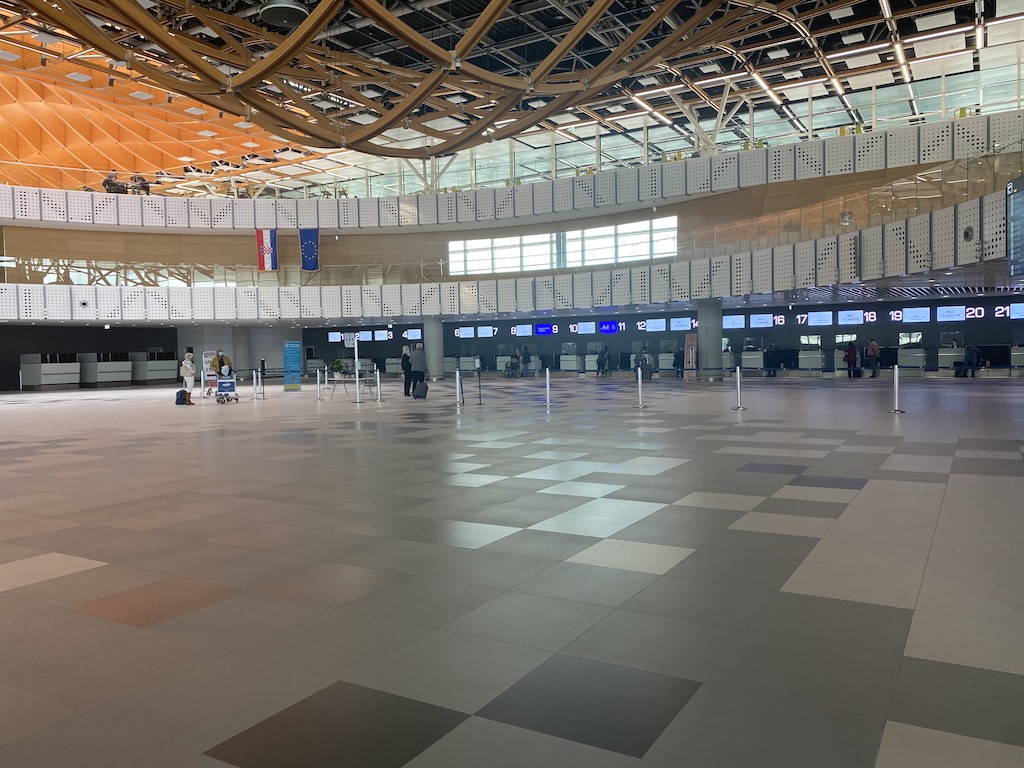
Since I was traveling on two different airlines to get to Barcelona (Eurowings to Stuttgart and Vueling to Barcelona) and was checking a bag, I technically needed to enter Germany. Remember, Croatia is on Germany's high risk list, and unless you have a negative test, you need to go into self-isolation once you've entered.
The flight attendant panicked before knowing I had a negative COVID-19 test in hand and assured I would have no issues. She then checked the entry forms for Spain to make sure I had everything I needed. I did.
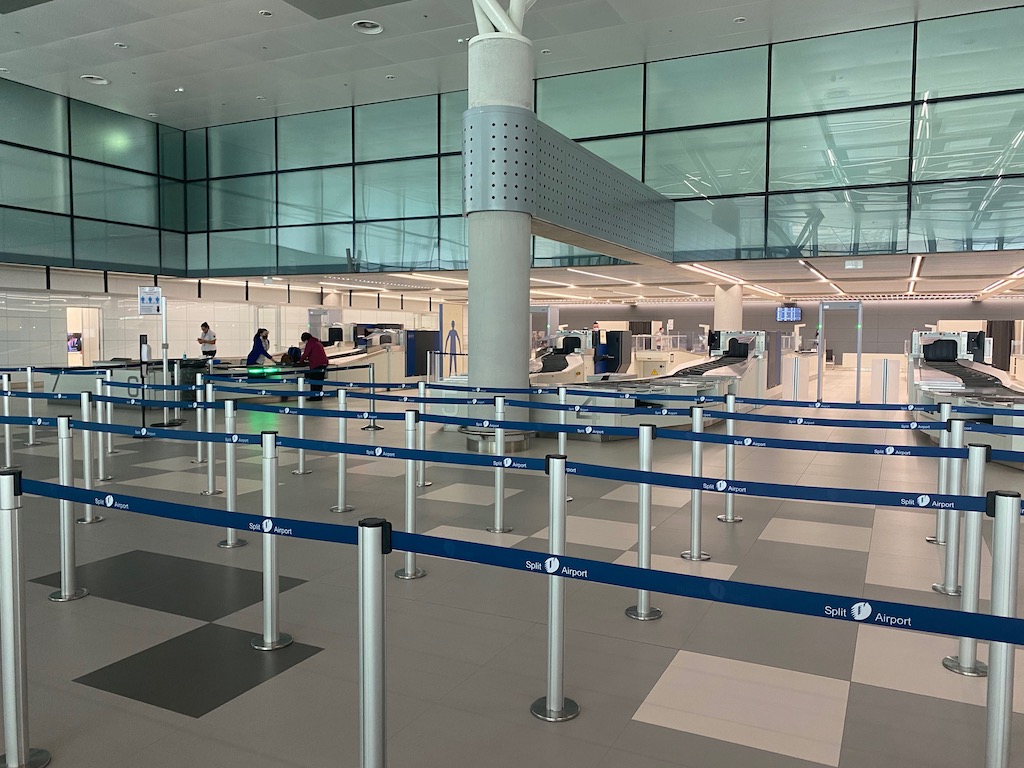
The security line at Split Airport - heaven.
After I made my way through security and passport control, I waited at the gate. One cafe and the Duty-Free shop was open. All seating was marked, so passengers maintain a social distance.
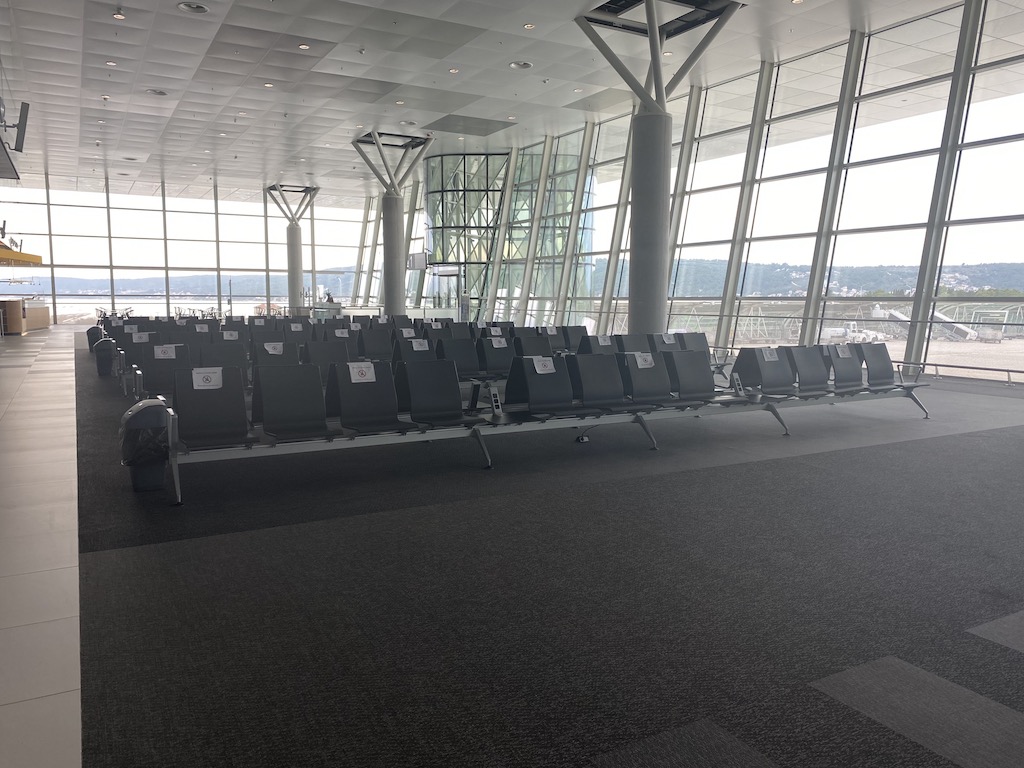
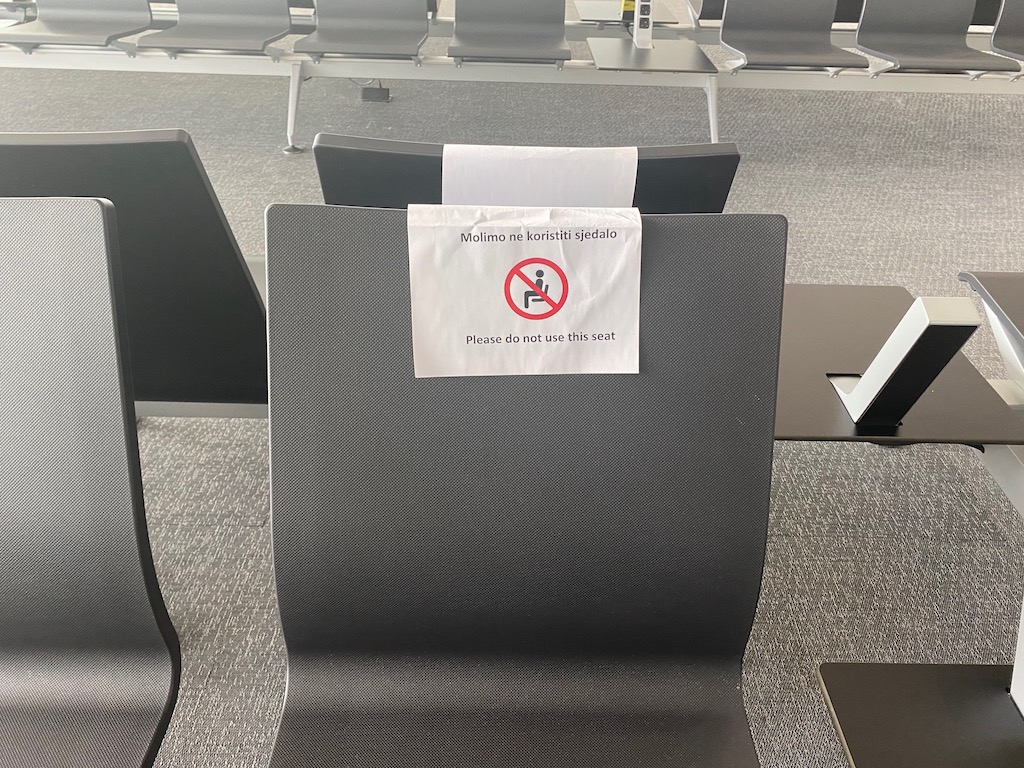
It wasn't long before the gate area drew a crowd, and I was beginning to think that the nearly empty seat assignment I saw just a few days before was no longer. Perhaps it had something to do with Germany announcing a lockdown on November 2.
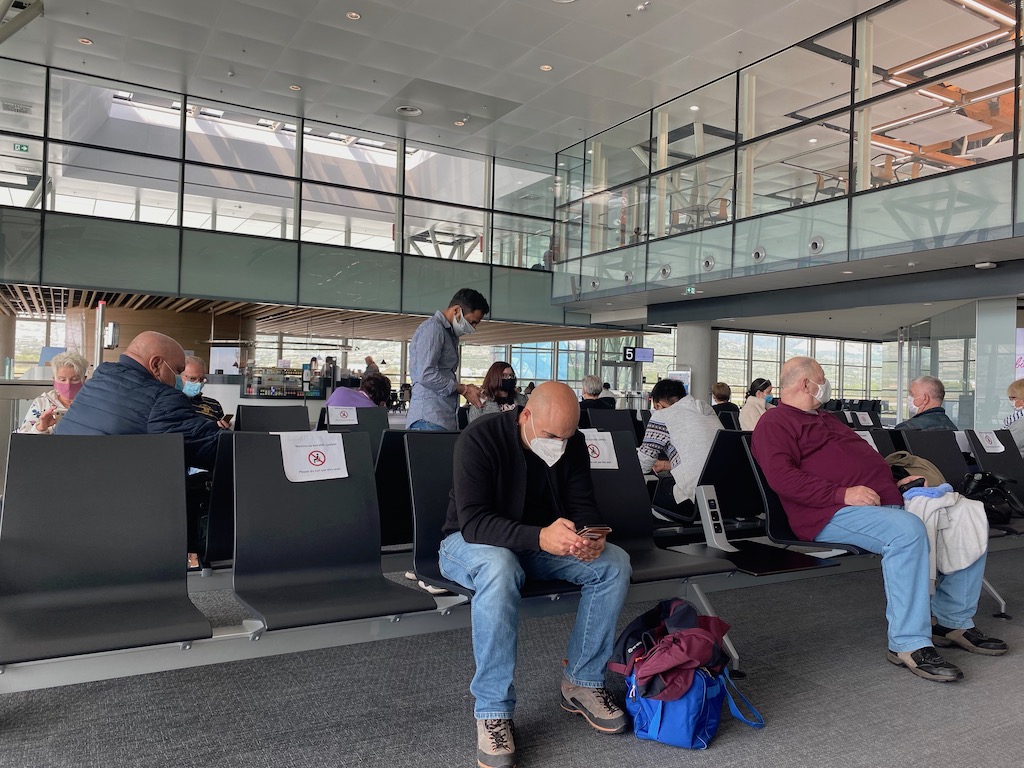
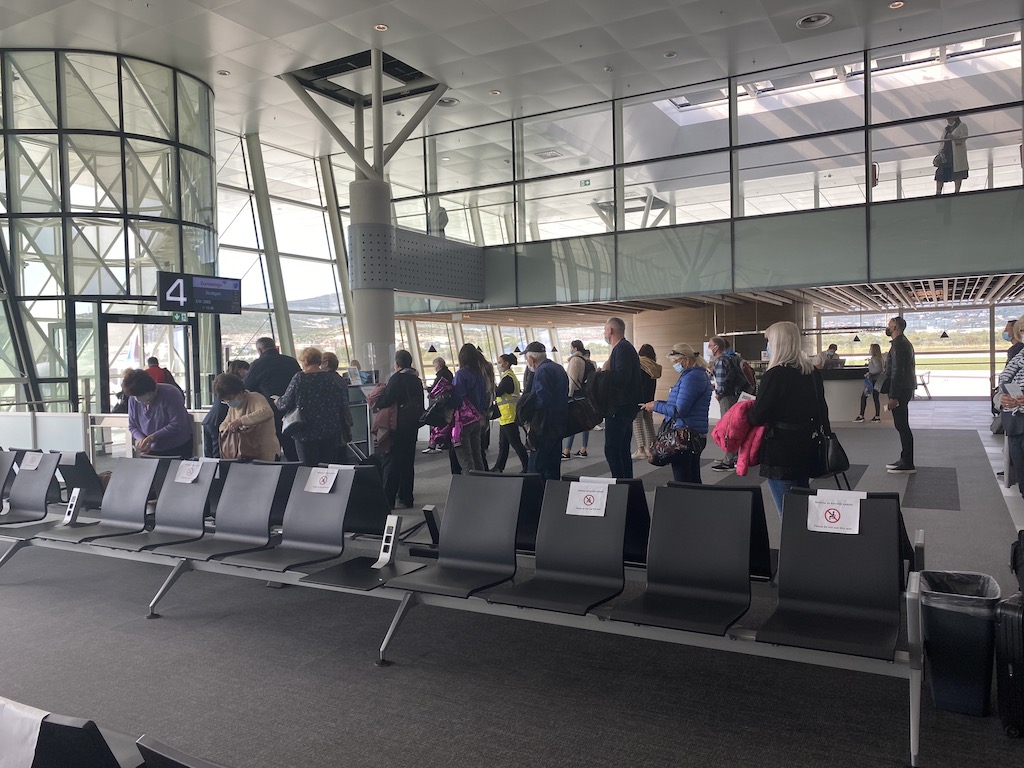
Masks are mandatory in the airport and on the flight. Numerous airport employees ensured everyone was not only wearing a mask but the right one. Cotton masks are not permitted on flights, and disposable masks were distributed if anyone needed one.
It was good that everyone followed the mask rule because, unfortunately, it was nearly impossible to maintain social distance on the way to Stuttgart.
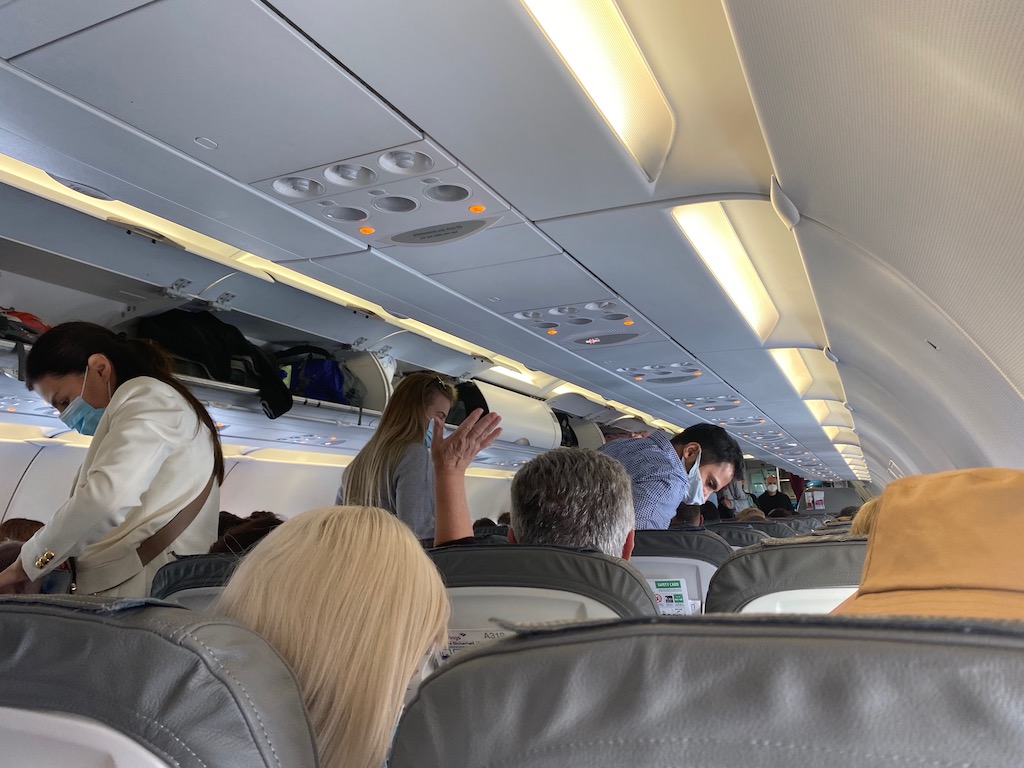
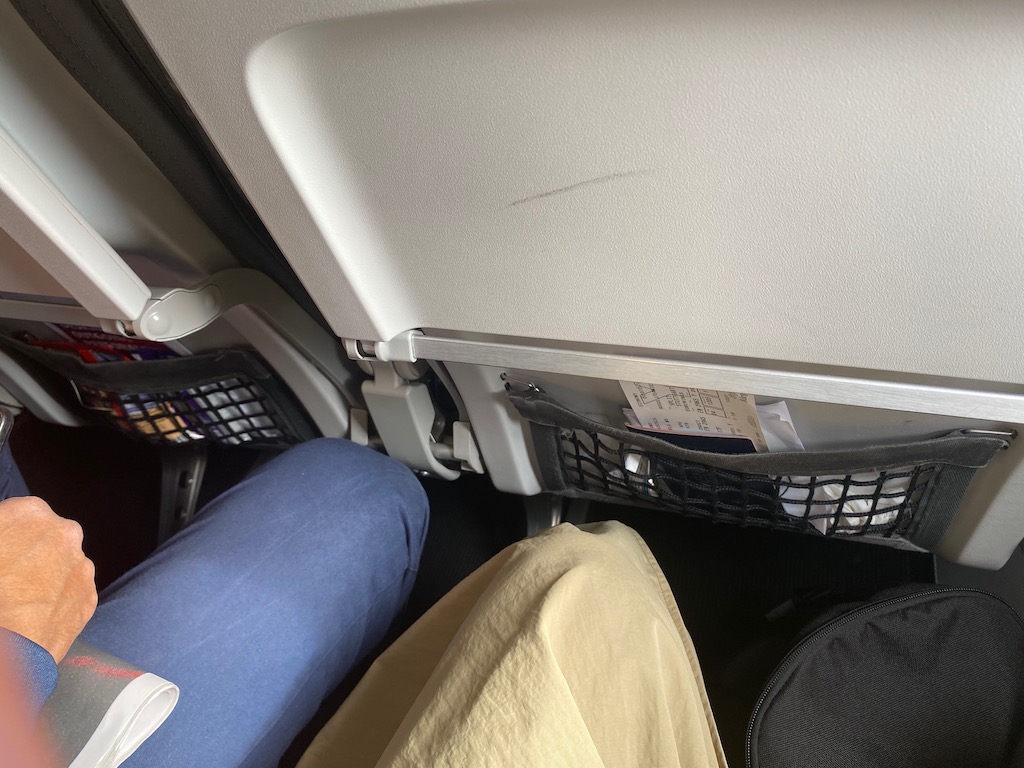
Smooth sailing so far, that is, until we disembarked the plane in Stuttgart and into passport control chaos. You see, all passengers are to be given a Public Health Passenger Locator form to fill out on the flight. This is then to be collected by the flight attendants at the end of the flight. Our Eurowings flight attendants failed to do so.
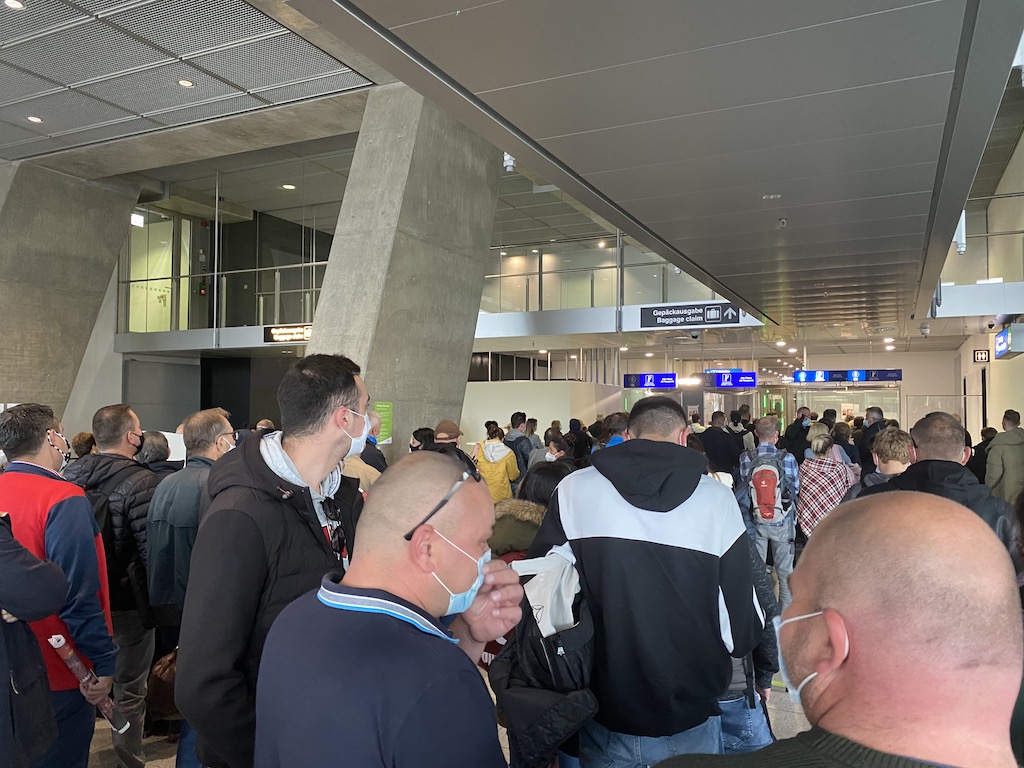
Not only were over 100 people pushed into the passport control area from my flight and another that arrived at the same time, but there was no order, nor was there anyone to ask for help. A good half hour into waiting, an officer arrived with the forms, calling for everyone who needed one to fill them out as they are required at the window.
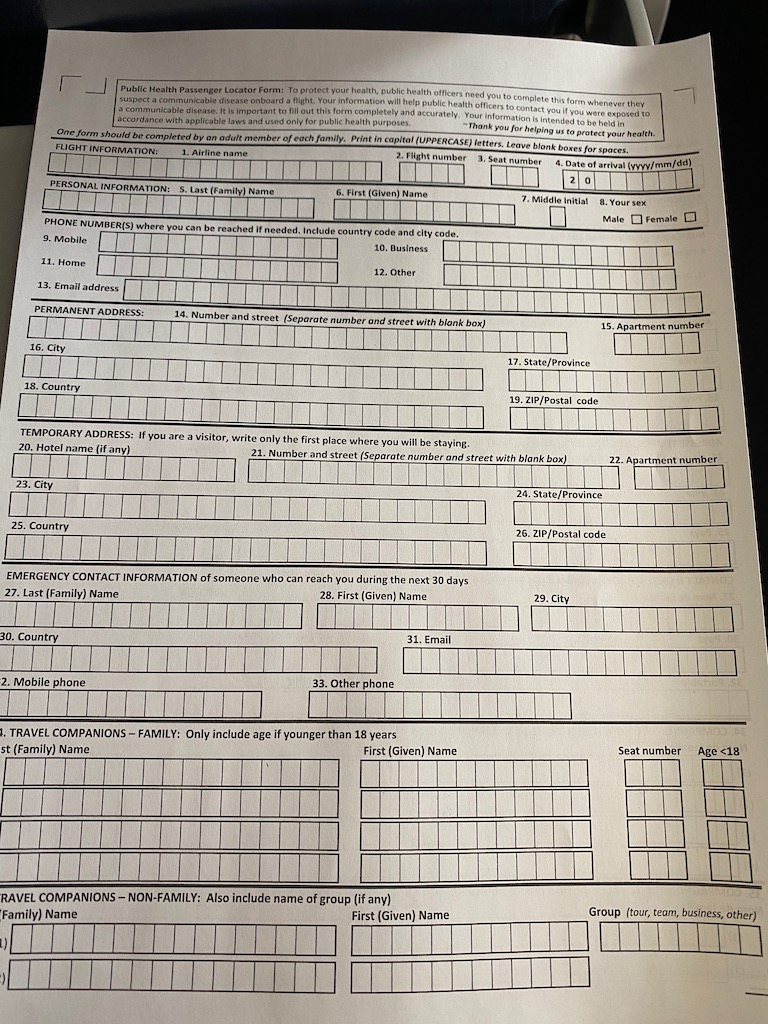
A photo of my form from one of my return flights on Air France
But the only forms they had were in German.
Crowds then gathered at the walls as we looked for translators to help us fill out the form. Some passengers yelled and the police had to escort someone out.
Since I wasn't staying in Germany and had a flight in just a few hours, I did not need to provide a temporary address and wrote 'not staying.' Once I finally made it to the window, they quickly looked at my passport, form, and negative test, and I was on my way to the baggage claim. Even though that went quickly, the entire passport control process took over one hour.
After I picked up my bag and went outside for fresh air before checking in for my next flight, a call from my partner made things worse:
"It looks like there is a ban on movement in Barcelona now. I am not sure what it means for you traveling, but it comes into effect at 6 am on Friday." It was 3 pm in Germany on Thursday. I knew I couldn't do anything until I got to Spain, and there was no turning back from Stuttgart now. I accepted that my 3.5-day trip to Spain might be extended.
I made my way up to departures to check into my Vueling flight to Barcelona with two hours to spare. The woman at the counter said nothing about the new measures, nor did she seem worried.
"Can I see the QR code on your entry form for Spain?"
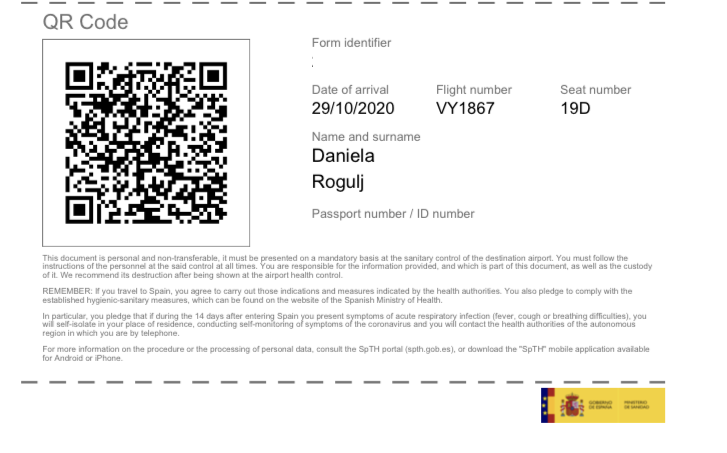
And I was on my way to security.
My Vueling flight to Barcelona was not nearly as full, and a seat between my row buddy and me had me feeling much safer than the Stuttgart fiasco I had just experienced. Two hours later, I was in Barcelona and only needed to scan the QR code at the airport to ensure I was healthy.
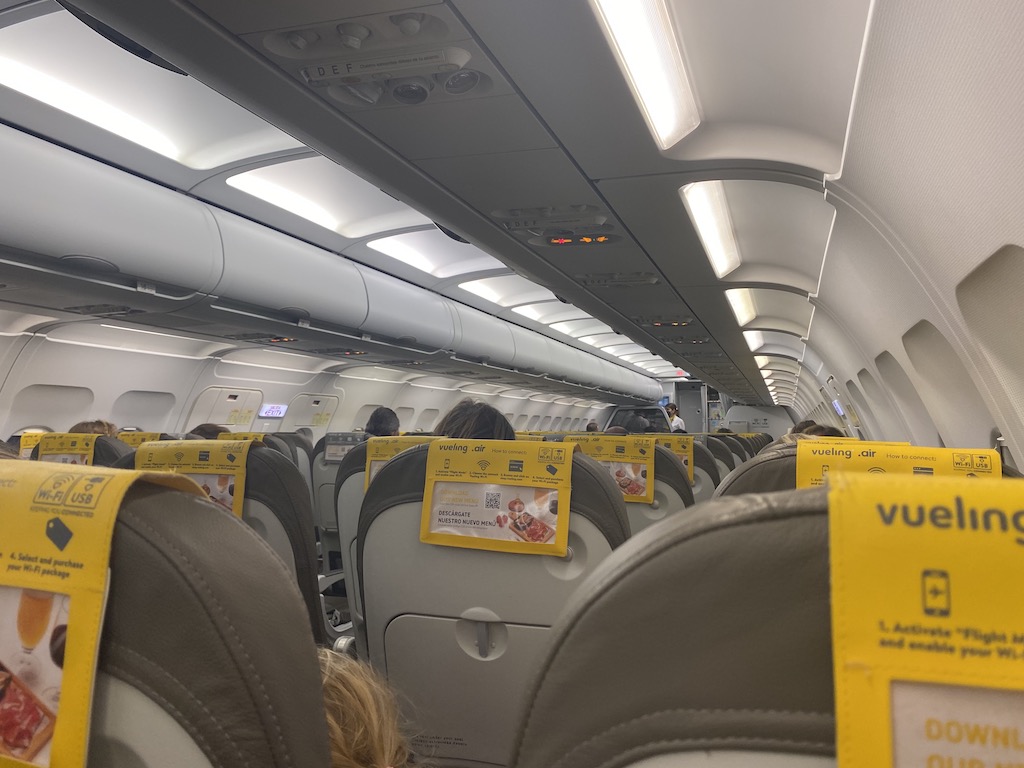
The atmosphere in Barcelona was not nearly as morbid as I anticipated. The COVID-safe hotel we booked took our temperature upon arrival and asked a series of questions about whether we had been infected or had any symptoms. Masks are mandatory inside the hotel and everywhere outside - and everyone in Barcelona followed the rules.
Hand sanitizer is placed at the entry to all shops around the center, which I noticed is used by 99.9% of people entering. While restaurants and bars are closed, delivery and pick up thrive, and the options were endless.
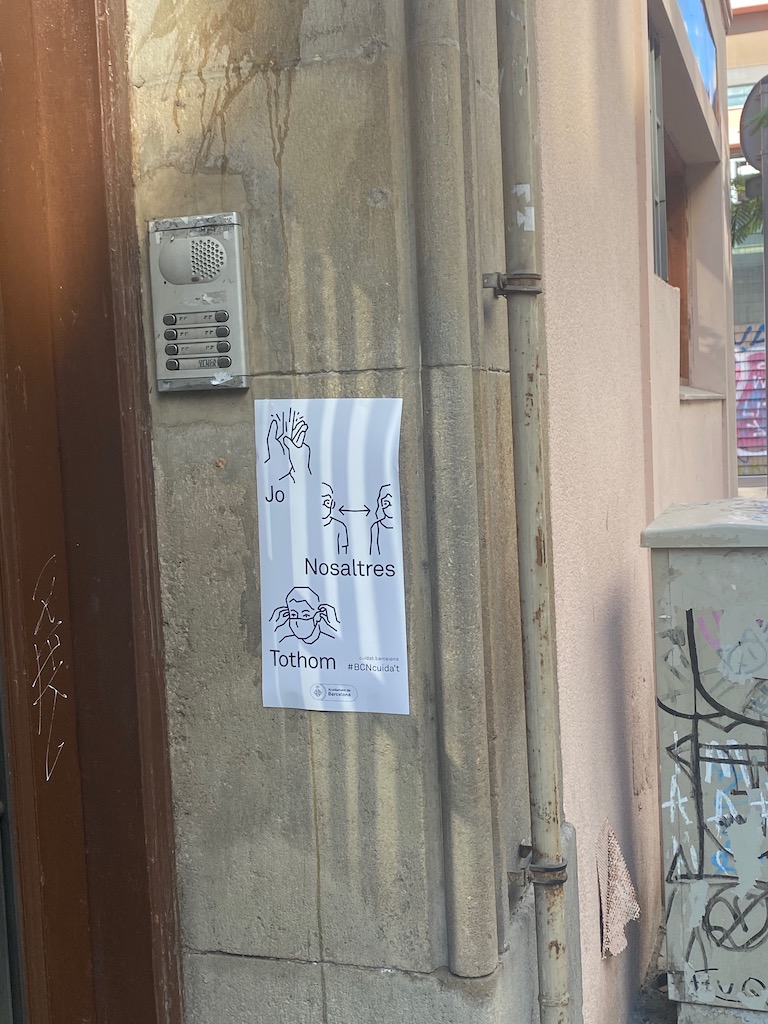
However, not everyone was pleased with the new measures on movement, and on Friday evening, the first day the measures came into force, some protestors were violent.
"Hundreds of people chanting “freedom” and “this is theft” took to the streets of Barcelona on Friday to protest against tough new coronavirus lockdown restrictions. Violent clashes with police lead to at least 12 people being arrested.
Bars and restaurants have been closed in Catalonia since the middle of October. But confronted by the spread of the virus, a 10 pm curfew has now been introduced as well as a ban on people leaving their home towns during all saints weekend," reported EuroNews on Friday.
"The measures imposed by the government of Spain and the Catalonian authorities more specifically don’t have any logic to them,” said one protestor. “They make no sense. What they should do is take more measures for hospitals, provide them with staff and material to help them to overcome this pandemic- not impose measures of social control on us," they added.
Police raced up and down the street of our hotel, where angry protestors burned trash bins 100 meters away. "I don't think your delivery food is going to make it," the hotel receptionist said.
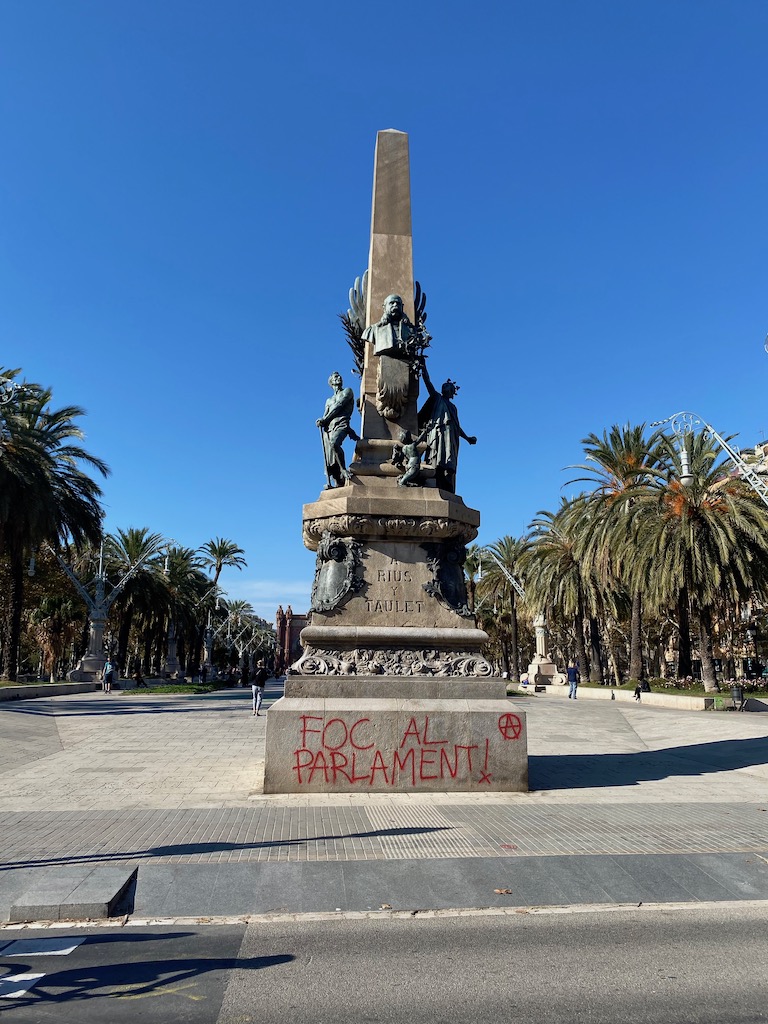
Our food came, in the end, and the disarray lasted a little over an hour.
On Monday morning, my wonderful weekend in Barcelona came to an end, though I did have my hesitations about how I would get to the airport during a curfew that lasted from 10 pm to 6 am (my flight was at 6:20). I ordered a taxi with the hotel reception who assured me there would be no issues. My taxi arrived at 4:30, and I was at the airport 20 minutes later. The streets were empty.
Getting through El Prat Airport was a piece of cake, considering I was traveling with only my carry-on back to Split. The line for checked baggage, however, was long - even at 5 am.
It was a rather eerier morning at the airport as most everything was closed until 6 am - or closed due to the pandemic.
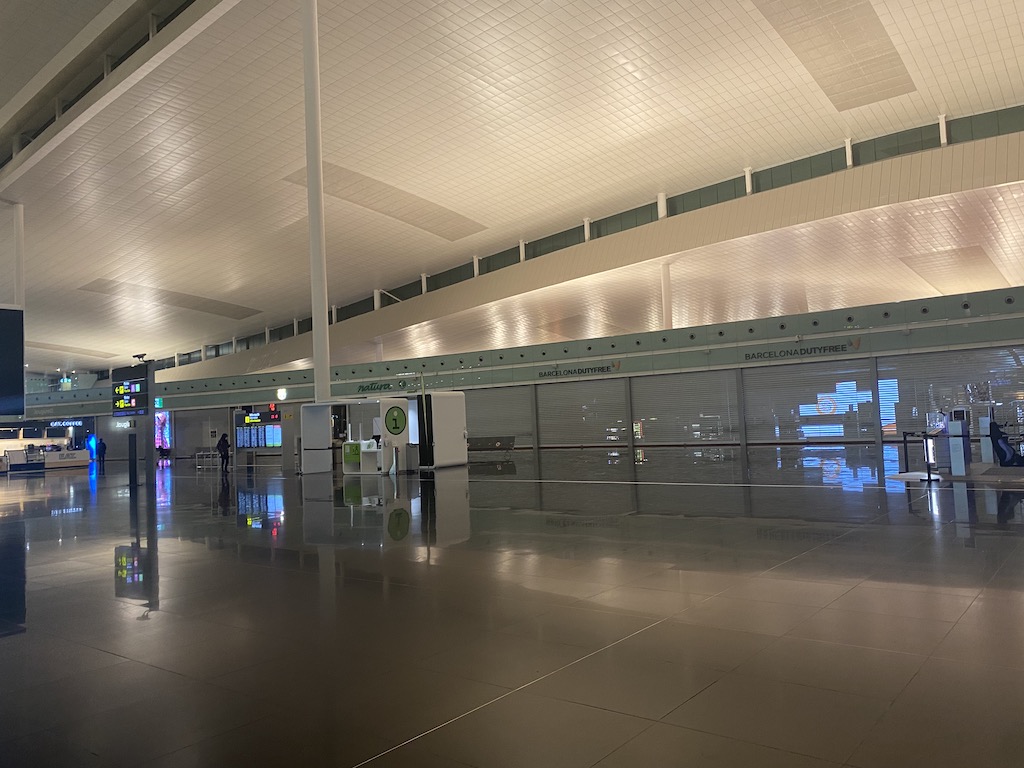
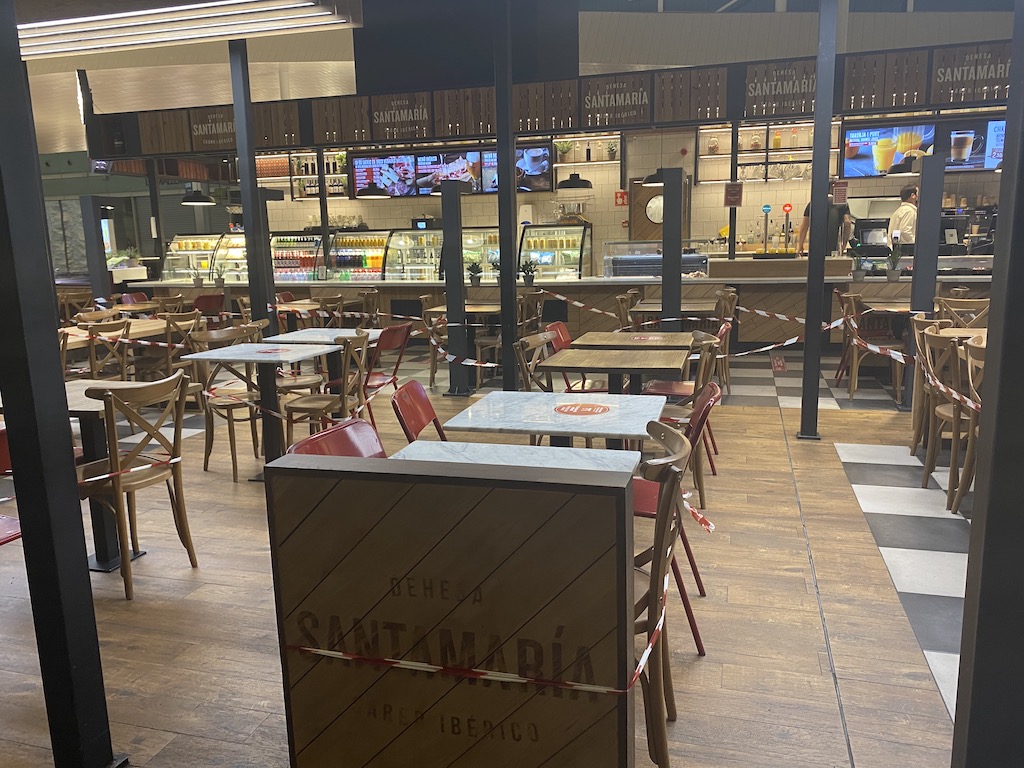
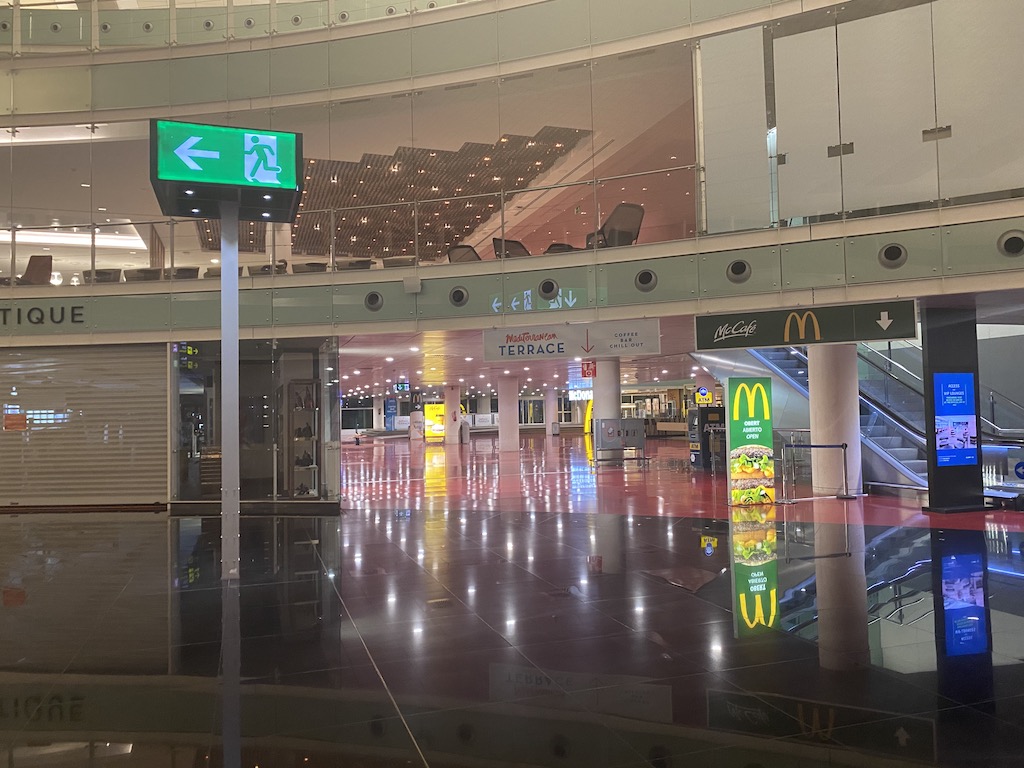
I flew Air France from Barcelona to CDG Paris, which was mostly full. I was one of the lucky ones to have no one in the middle seat.
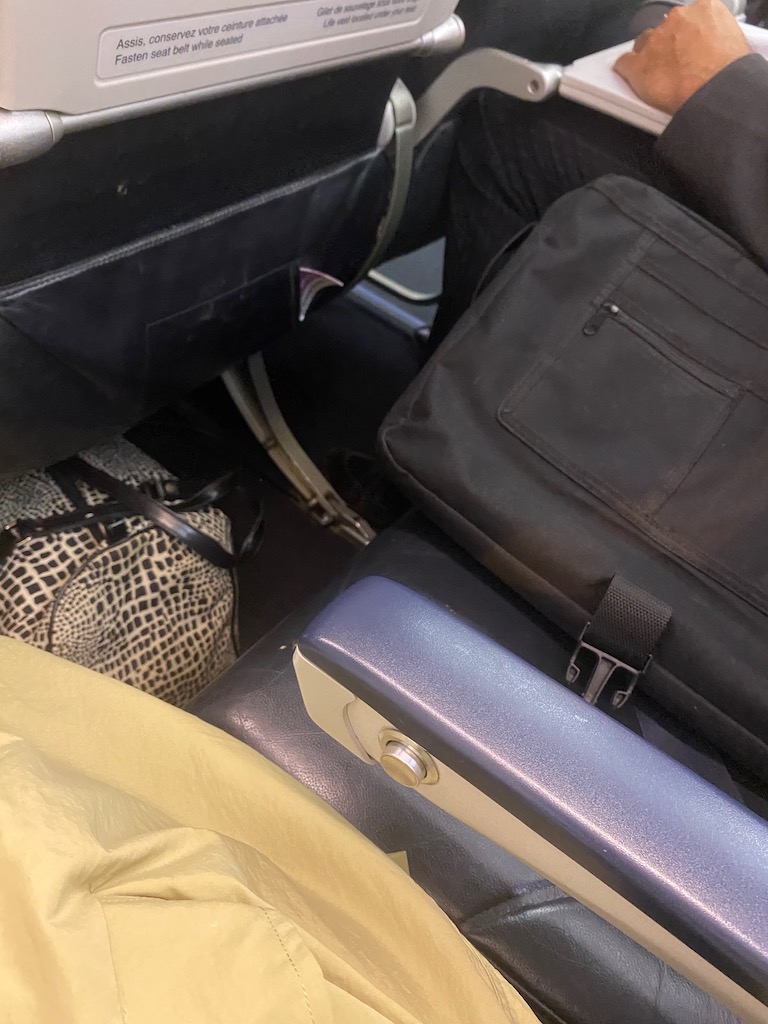
Arriving in Paris was a dream. Airport employees could be found at every point to make sure crowds never formed and passengers were getting where they needed. On my rather long walk to my connecting flight to Zagreb, I even noticed an Antigen Testing Center.
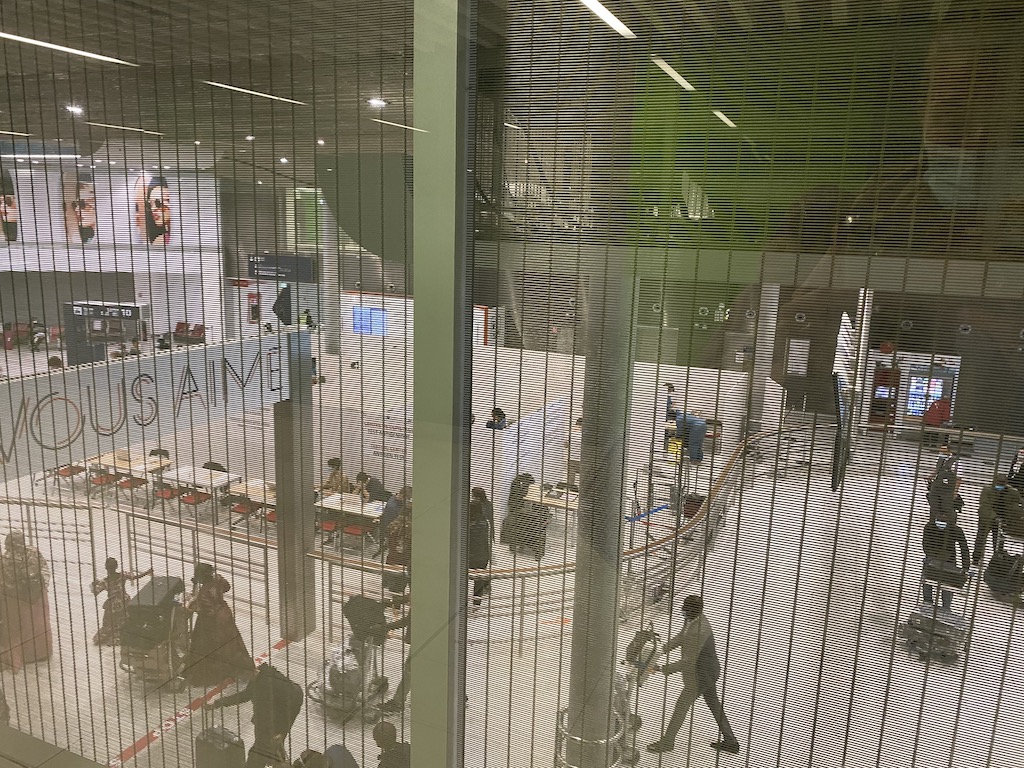
CDG felt awfully familiar, and not so much unlike the travel we are used to. Apart from the travelers in Hazmat suits.
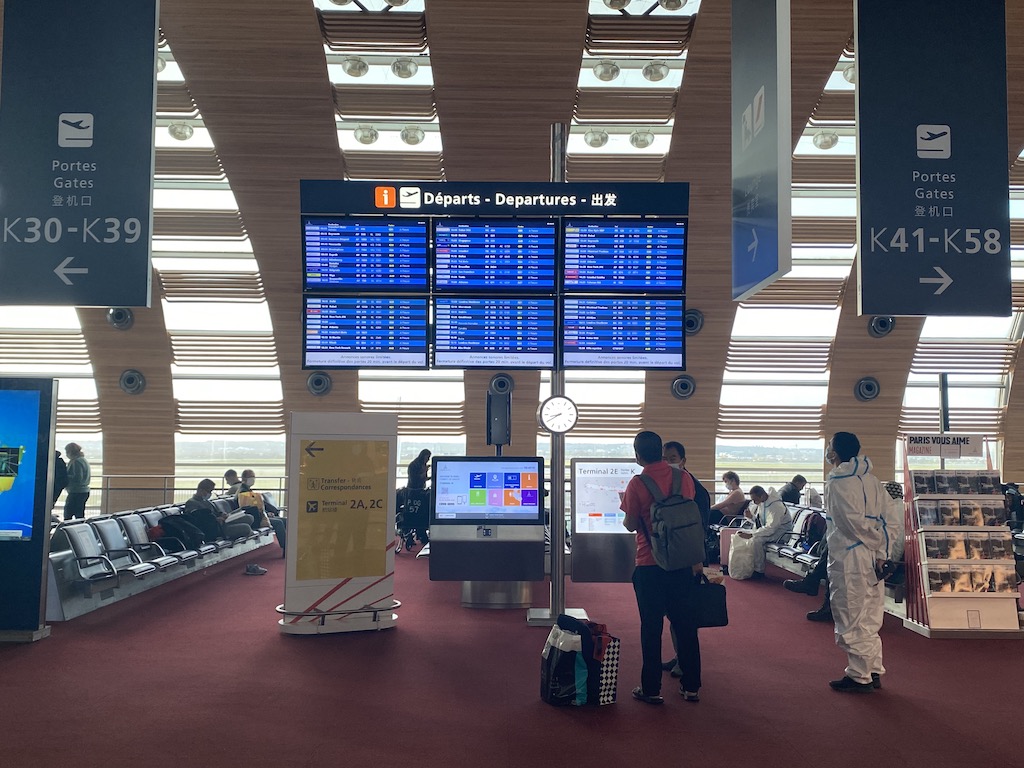
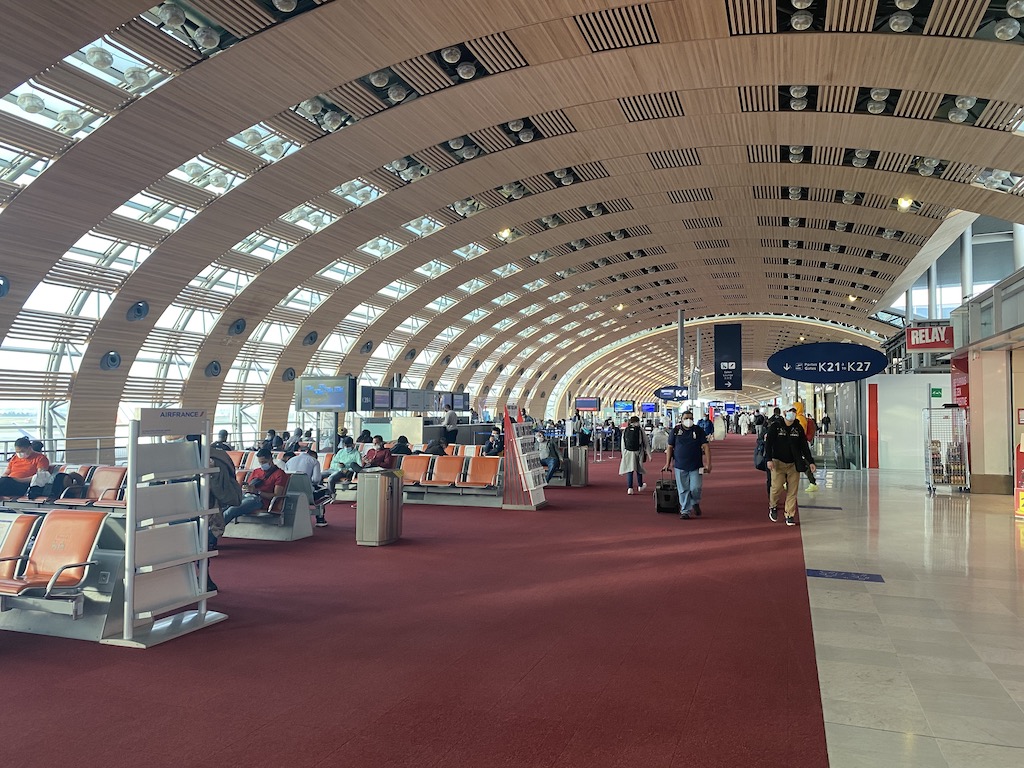
Most shops and food stops were open, though seating areas were closed off.
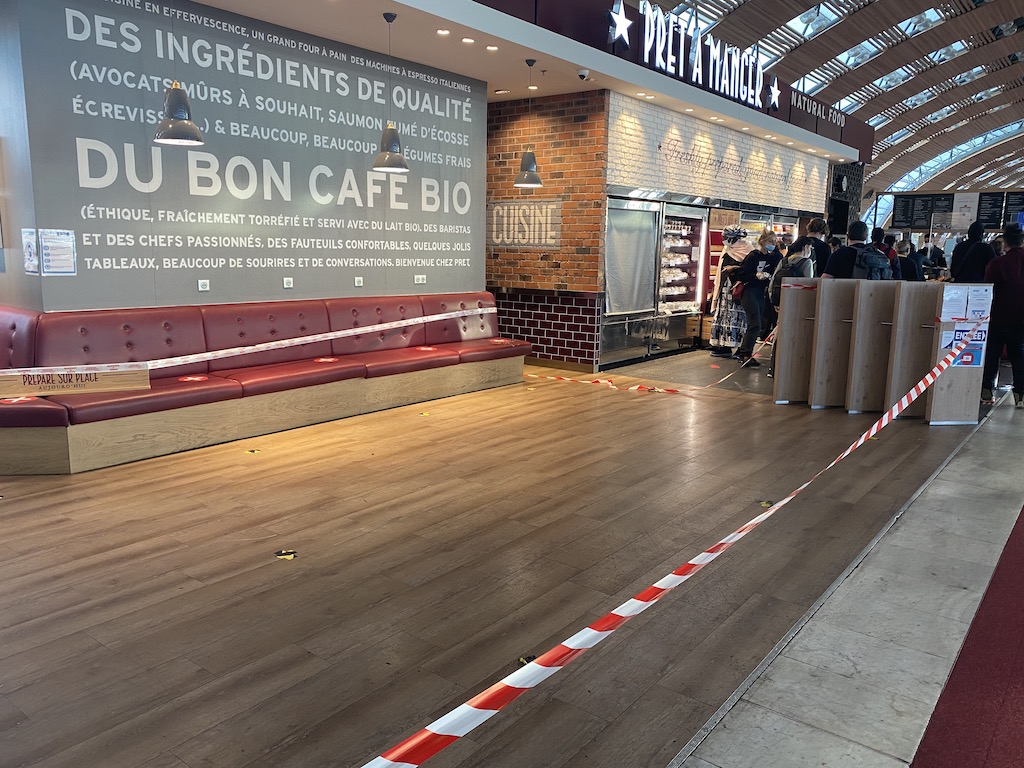
Our temperatures were checked before boarding the Air France flight to Zagreb.
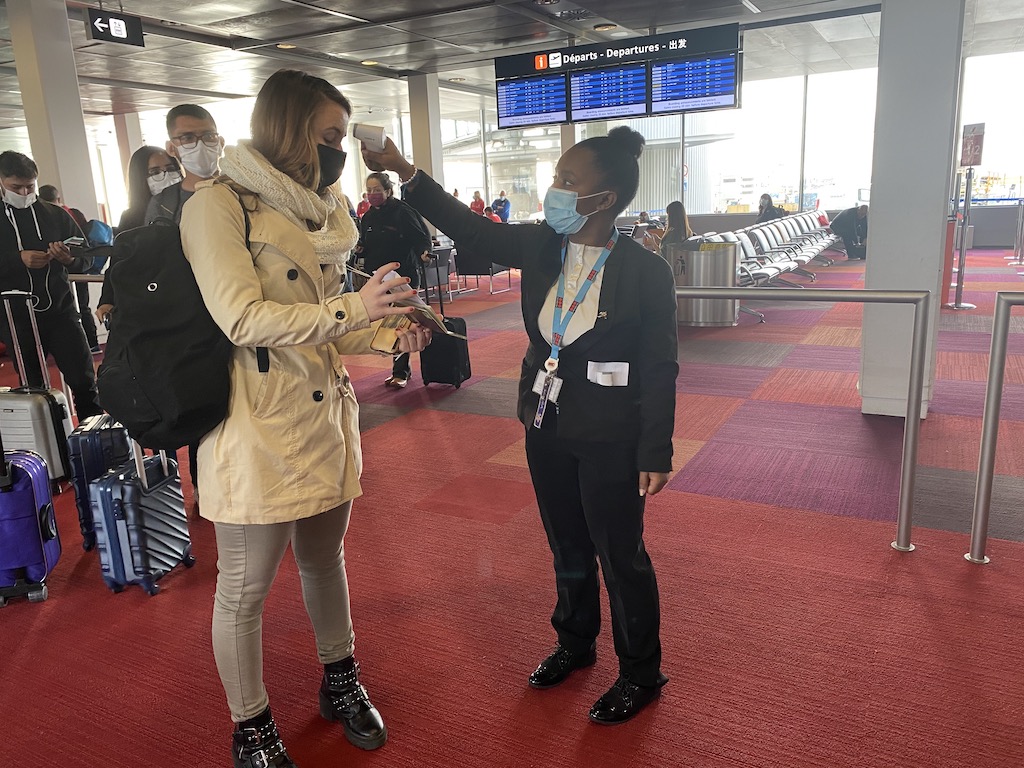
The flight to Zagreb was unexpectedly full and included a Spanish Judo team and young Europeans escaping to the capital for looser measures. I have never been more relieved to get back to Croatia in one piece.
Only one more flight to go before I was back in Split...
Zagreb Airport was covered in signs reminding passengers to wear masks, keep a distance, and wash their hands.
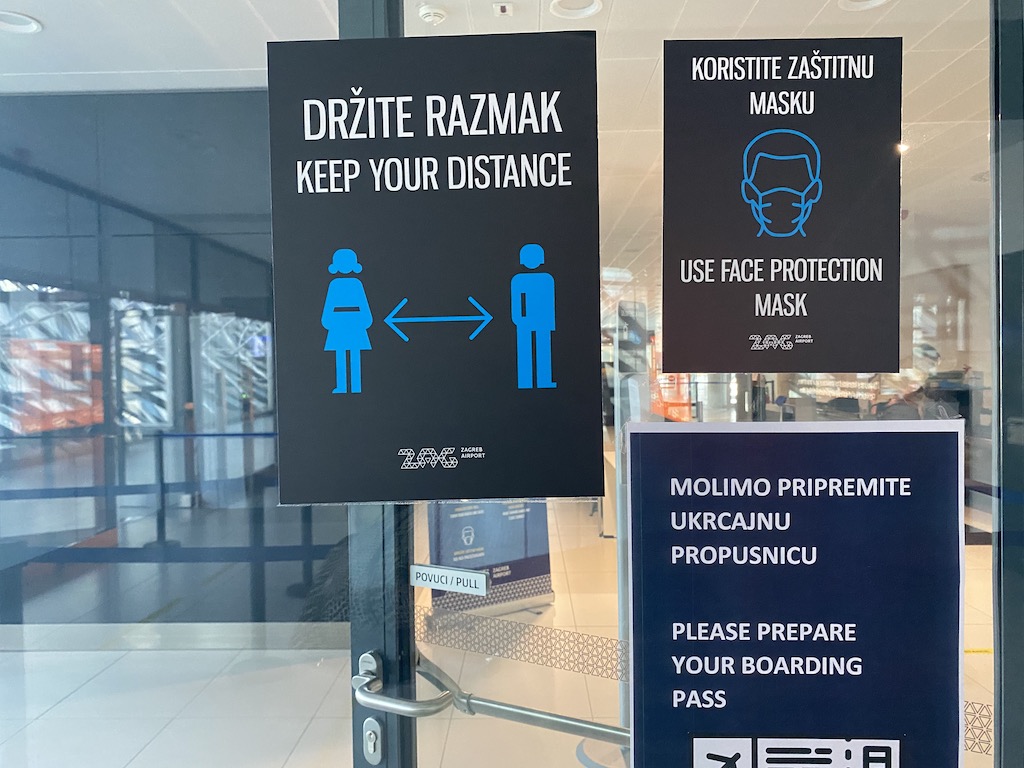
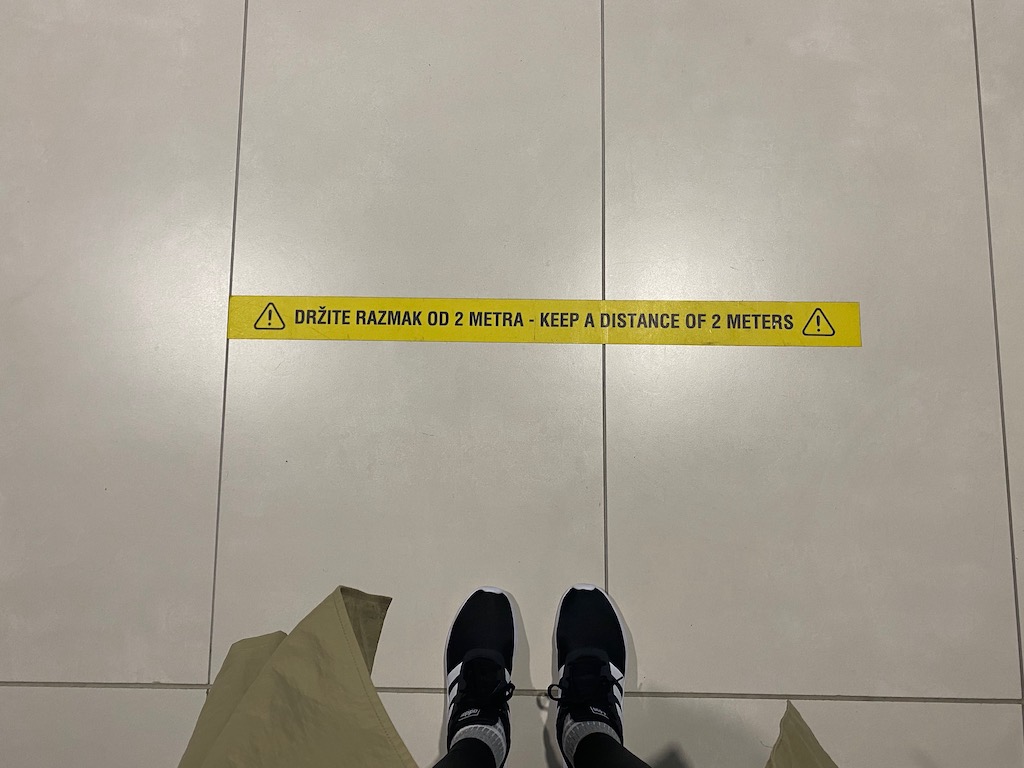
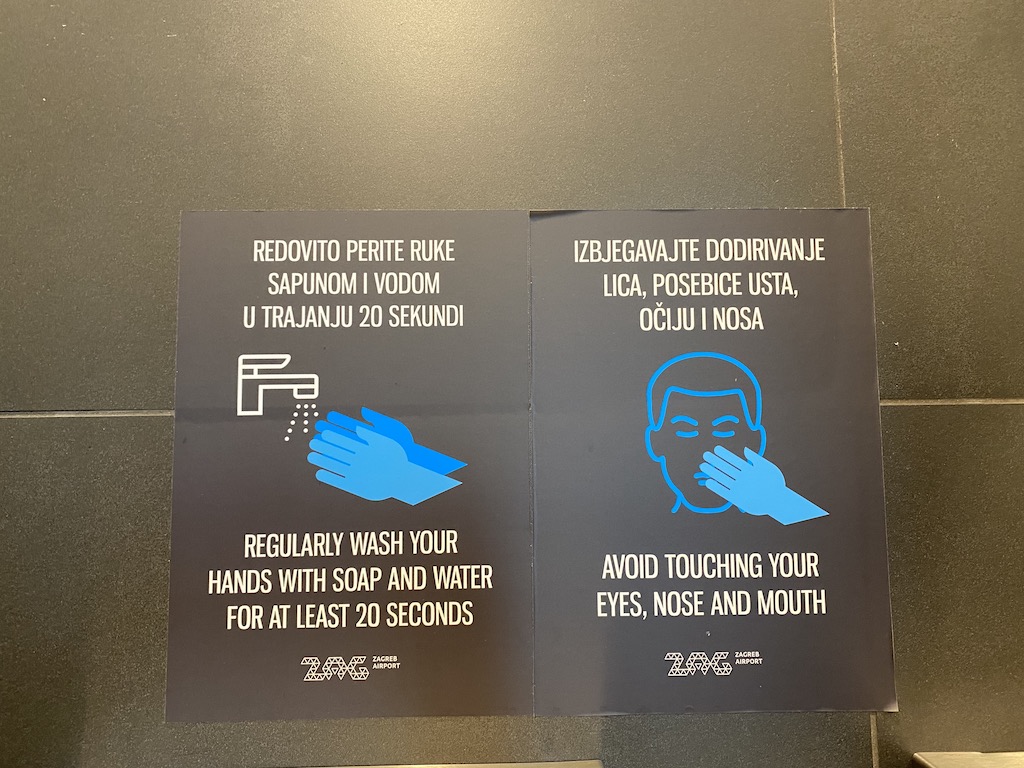
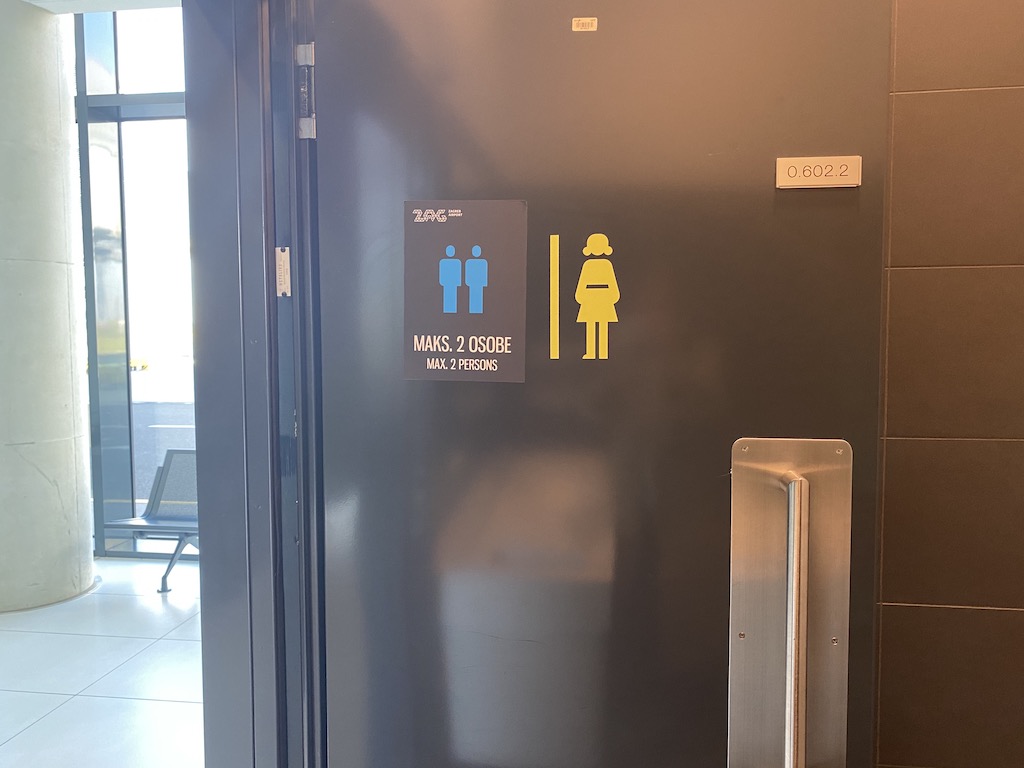
There was even a group of Americans waiting to board my flight!
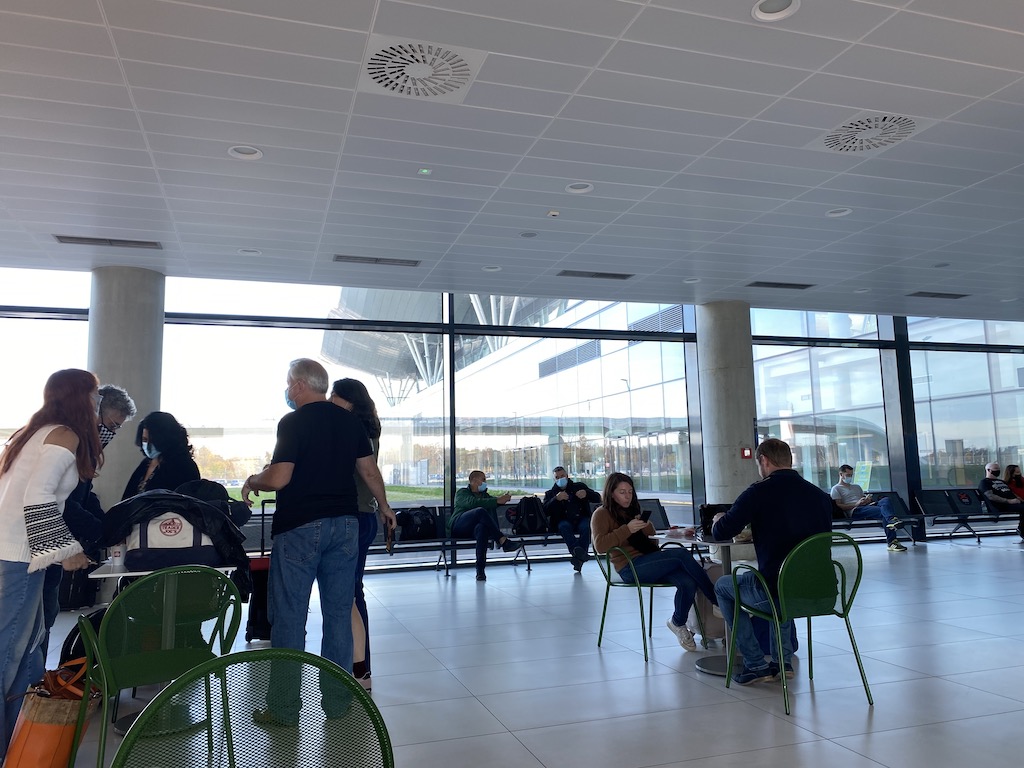
Markers reminding us to social distance were also found on the bus to our plane.
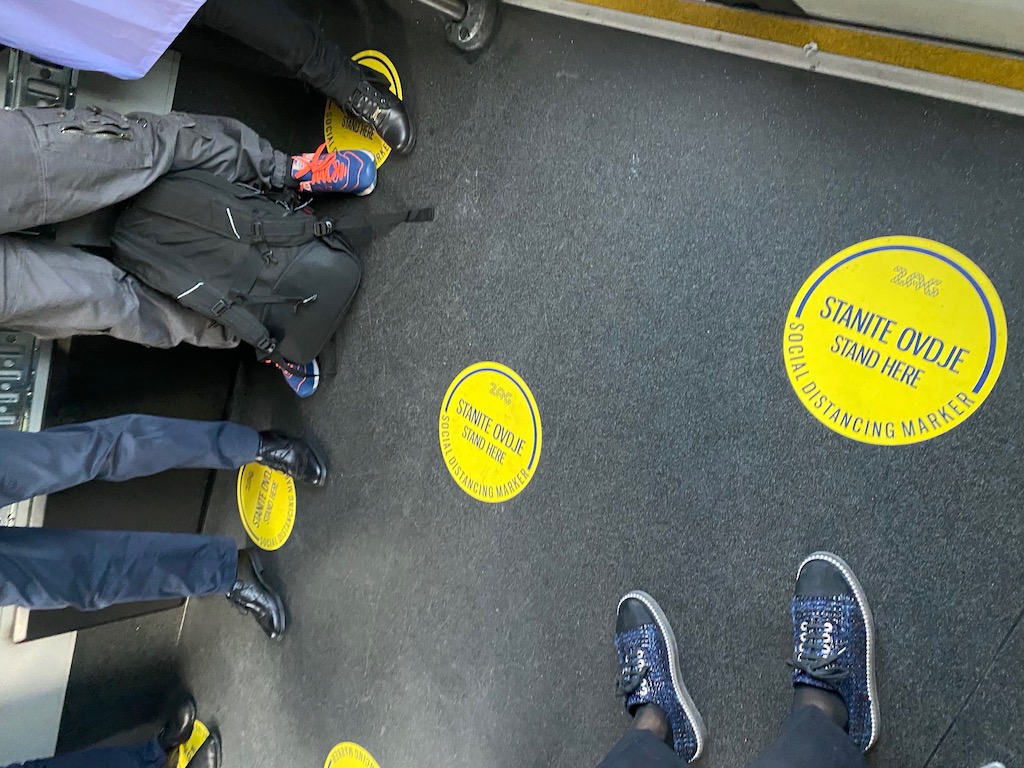
The last leg of my journey, from Zagreb to Split on Croatia Airlines, was also surprisingly full. We were greeted with hand sanitizing wipes as we entered the plane.
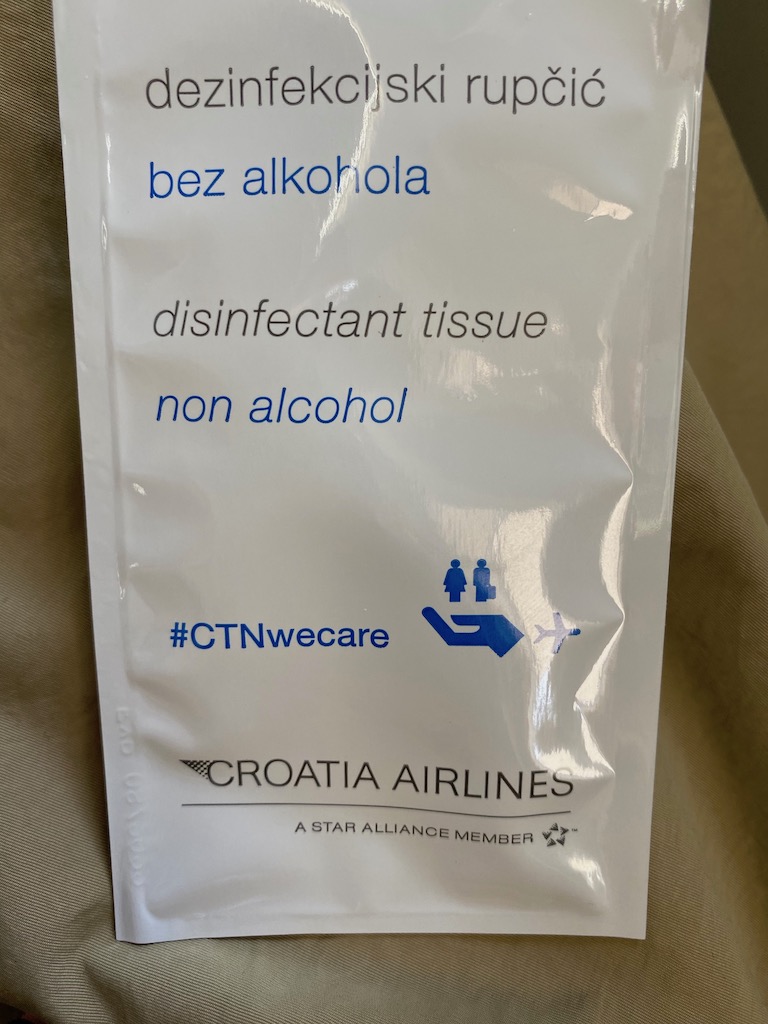
After a painless walk through Split Airport, I was on my way home to self-isolate, just to be safe.
Traveling during a pandemic, would you do it?
For the latest travel info, bookmark our main travel info article, which is updated daily.
Read the Croatian Travel Update in your language - now available in 24 languages.
Plenkovic: No Room for Panic while Fighting Coronavirus
ZAGREB, Nov 3, 2020 - Prime Minister Andrej Plenkovic said on Monday that there was no room for panic during the struggle to limit the spread of coronavirus.
In his interview for the national broadcaster HTV, Plenkovic also commented on the criticism levelled by President Zoran Milanovic against his cabinet and its actions to contain the spread of the epidemic.
"There are people who make serious efforts in the struggle against coronavirus and there are those who compare the virus with tooth decay or claim that handshaking is o.k. and that one should not wear a protective mask. Such statements carry messages about undermining the discipline and recommendations made by epidemiological experts," Plenkovic said, alluding to some previous statements made by Milanovic.
"The national COVID-19 crisis management team operates, based on the law, and under the supervision of the government. All that we do is in the interest of the health conditions of our citizens and for the purpose to contain the spread of the epidemic," Plenkovic said.
Asked by the anchorwoman whether after the political one-upmanship between the Office of President Zoran Milanovic and his cabinet, cooperation between him and the president was possible, the premier said that the cooperation was possible to the extent envisaged under the constitutionally defined powers.
"It is is possible as much as necessary," he added.
Plenkovic said that Croatian healthcare system had enough capacity to cope with the pressure imposed by the current situation.
"We can now see that there are indications of a slower growth of (the epidemic) than it was a few weeks ago," he said.
There is no need for panic as the healthcare system is strong enough to endure this pressure and that the actions being taken to handle the epidemic are based on the strategy that is proportional to the dynamic of the infection, he said.
Commenting on the first 100 days of the second term of his cabinet, Plenkovic recalled that the elections had been held in early July, at the most opportune time, and that since the establishment of the current cabinet, they had prepared the 2020 budget revision, a draft budget for 2021 and a new round of tax reform, and they had also made important steps in combating corruption.
President Says Would Support Possible Lockdown but Not Curfew
ZAGREB, November 2, 2020 - President Zoran Milanovic said on Monday that he would support a possible lockdown to help in efforts to curb the spread of coronavirus, but he would oppose a curfew, explaining that Croatia is not in a state of war but in an emergency situation.
"I will be the first one to back a lockdown but not a curfew," Milanovic said, adding that he was against a curfew and against situations where people, who, for instance, walk their dogs after 8 p.m., have to explain why they are outside.
Addressing reporters after a ceremony marking the 30th anniversary of the Social Democratic Party at whose helm he was from mid-2007 to late 2016, the president said that any decision on imposing a lockdown could not be made by Prime Minister Andrej Plenkovic or the head of the Croatian Institute of Public Health (HZJZ), Krunoslav Capak, but that it was the responsibility of the national parliament.
Damage to be caused by a lockdown is huge, people are at the end of their tether, notably those who do not work in the civil service, Milanovic said, adding that society should care for the elderly and the ill, while others should behave responsibly and prudently.
He went on to say that the current situation requires more engagement from some professionals, for instance, physicians, adding that "there are enough doctors, but they should be paid well," and that Finance Minister Zdravko Maric should take care of that.
In a message to the government and the ruling Croatian Democratic Union (HDZ), Milanovic said they should not be "hiding behind clerks" and leaving decisions they are afraid to make to HZJZ head Krunoslav Capak.
"It is unfair," he added.
Milanovic says willing to attend Vukovar commemorative march but...
In connection with the 29th anniversary of the fall of the eastern town of Vukovar and the southern town of Skabrnja into the hands of the Yugoslav People's Army and rebel Serbs, to be marked on 18 November, Milanovic said that he was willing to attend the commemoration in Vukovar.
"A lot will depend on an agreement between Plenkovic, (war veterans' minister Tomo) Medved and (Vukovar Mayor Ivan) Penava and the local bunch," Milanovic said, adding that attending the ceremonies was definitely an honour and a duty.
He noted, however, that before his departure to Vukovar he would consult the Security and Intelligence Agency (SOA), because "I do not have to take part in any shows."
In that context, he said that he did not want a recurrence of the situation of 18 November 2013, when he and some other state officials were prevented from joining the commemorative march through the city.
Croatia Confirms 1,165 New Coronavirus Cases, Record 32 Deaths in Last 24 Hours
ZAGREB, November 2, 2020 - Croatia on Monday reported 1,165 new coronavirus cases in the last 24 hours and 32 related deaths, the largest number of fatalities in a single day.
The number of active cases in the country is 14,734. Of them, 1,127 are hospitalised, including 94 who are on ventilators, the national coronavirus response team said in a regular morning report.
Since February 25, when the first case was confirmed in Croatia, 52,660 people have been infected with the novel virus, of whom 594 have died and 37,332 have recovered, including 2,293 in the last 24 hours.
Currently, 25,925 are in self-isolation. To date, 507,163 people have been tested, including 5,115 in the last 24 hours.
Zdravko Maric Highlights EU Funds as Key to Croatian Recovery
As Poslovni Dnevnik/Jadranka Dozan writes on the 1st of November, 2020, in an environment dominated by the unpredictable course of the ongoing coronavirus pandemic, it's very difficult to predict and plan, so even with the state budget proposal for next year adopted yesterday, the Government session strongly pointed out that it reflects only the basic scenario. Do EU funds provide the answer to Croatian recovery?
The government has more or less remained on the trail of macroeconomic assumptions from the September Budget Guidelines, based on the epidemiological picture from the end of August, which has meanwhile deteriorated globally. However, the assumptions in the budgeting reflect the expectation of a return to last year's level of economic activity at the end of 2022.
After this year's 8 percent drop in GDP, a growth rate of 5 percent is expected in 2021, and then Croatian recovery and economic growth of 3.4 percent and 3.1 percent over the next two years, respectively. The biggest contribution to growth next year should come from the recovery of exports of goods and services (primarily tourism), which, like this year's decline, should be in the double digits.
However, as imports are expected to grow at the same time, the contribution of net exports to Croatia's enfeebled GDP growth will ultimately be lower than what is expected from personal consumption. Household spending is expected to rise 4.5 percent next year after falling 6.3 percent this year, according to government expectations.
When it comes to investing, the expectations are somewhat more modest; after an estimate of the decline for this year, the expectation for 2021 is growth of less than four percent.
The total budget revenues for 2021 are planned at 147.3 billion kuna or 12.3 percent more than the new plan for this year. When compared to last year, it's been eventually reduced by almost nine billion, as a result of 12 billion kuna less revenue from taxes and contributions, but with a simultaneous increase in revenues owing to very welcome EU assistance.
On the other hand, total expenditures from all sources are planned for less than 158 billion kuna next year, which is an increase of two billion or 1.3 percent more than the rebalanced plan for 2020.
However, Minister Zdravko Maric emphasised that expenditures financed from sources that affect the deficit (from general revenues and receipts) are planned at 118.4 billion, which is 3.6 billion kuna less than the new plan for 2020.
Unlike this year, when 5.4 billion of payments under coronavirus measures 5.4 were financed from sources that affect the deficit, according to the plan for next year, 2.1 billion kuna under these measures are planned to be financed from EU funds (React EU), and from sources that affect the deficit - only 100 million.
Katanciceva also calculated that, when the impact of the government's coronavirus measures is excluded from the expenditures, total expenditures financed from general revenues and receipts of the general government budget will increase by 1.7 billion kuna or 1.5 percent next year.
''The further deepening of the coronavirus crisis represents a great risk that is currently difficult to assess, and it would have a negative impact on budget revenues as well as on the needs of the economy for additional measures,'' pointed out the Minister of Finance, Zdravko Maric.
In the planning of the state budget, Maric explained that the goal remains the sustainability of public finances, with the control of expenditures and continued tax relief. In terms of Croatian recovery, European Union funds are generally gaining in importance.
In addition to the EU budget in the coming years, these funds which will greatly aid Croatian recovery as a whole include a combination of grants and loans from the recovery fund under the EU Next Generation instrument, and in the Croatian case there are significant funds from the Solidarity Fund for Post-Earthquake Reconstruction available.
Croatia will thus have a total of 23.5 billion euros or about 176.3 billion kuna available for strategic, development and reform projects at its disposal, while it can count on 5.1 billion kuna from the Solidarity Fund for the reconstruction of earthquake-damaged areas.
The baseline scenario of macroeconomic and budgetary developments should also result in a return of the level of public debt and deficit to a downward trajectory.
When it comes to budget expenditures that affect the fiscal balance, the largest increases next year (compared to the rebalanced plan for this) are expected as a result of tax relief in income tax, the effect of which is estimated at two billion kuna.
Therefore, the budget envisages 1.5 billion kuna more in the name of compensation to local and regional self-government units.
Expenditures for employees (including education) are planned to increase by almost half a billion (493 billion kuna) next year, with these expenditures being increased by approximately the same amount as part of this year's rebalance. A little less than 435 million kuna increase refers to participations for EU aid.
For the latest travel info, bookmark our main travel info article, which is updated daily.
Read the Croatian Travel Update in your language - now available in 24 languages
Croatian Professor Gordan Lauc: Most Difficult Part of Pandemic Awaits
As Poslovni Dnevnik writes on the 1st of November, 2020, Croatian professor Gordan Lauc discussed various things to do with the ongoing situation with the new coronavirus. He looked at what stage of the pandemic we're in, whether or not another lockdown would help us and why some develop a more severe clinical picture and some go through a mild form of the disease.
"One day we'll learn about this pandemic in school, and it will teach us that our real enemies are pathogenic bacteria and viruses," said Professor Gordan Lauc at the end of his interview for HRT.
Croatia seems to be climbing in the number of infected people, in Zagreb every second person tested returns a positive result, is the situation really so dramatic?
There's a really large number of infected people in Zagreb and all of Croatia at the moment. My personal estimate is that at least 5%, and probably more, of people in Zagreb are actively infected. This means that the situation is really dramatic and that we all now have to be maximally responsible and be careful not to get infected ourselves, but also not to infect others because a lot of people are infectious without even knowing it. But the night is darkest just before dawn, and we can already see signs that the exit from this tunnel is in sight.
After a very large acceleration in the spread of the epidemic over the last few weeks, we can see the first clear signs of a change in trend and a slowdown in the spread of the pandemic. This is especially evident in Zagreb, where the daily number of cases hasn't been growing for a week now. But we mustn't forget that the increase in the number of hospitalised and dead people is two to three weeks behind the number of newly infected, so in Croatia, unfortunately, in the next few weeks, we're going to have increasing battles because of seriously ill people, as well as people dying.
Countries in Europe are mostly opting for the so-called lockdown, closures, curfews, what exactly do we get with that?
The virus is spread by it being passed from one person to another. Without contact between people there can be no spread of the virus. All governments across Europe are taking steps to reduce this contact. In some countries these are well thought out and measured measures, while in some other countries they're panic reactions.
I think that we in Croatia have a well-balanced policy of adapting our measures to the real situation. This is best reflected in the fact that despite the fact that Croatia had one of the mildest measures in Europe all summer, today we have significantly fewer infected people per million inhabitants than, let's say, the Czech Republic, Belgium or Slovenia.
Some think that Croatia should have stricter measures, but from the examples of countries such as Argentina or Peru, and some cities in Europe, we can see that the imposed measures don't actually achieve the desired effect. For example, after 5 months of a very strict lockdown, Argentina has almost caught up with Brazil (which had much milder measures) in terms of the total number of deaths per million inhabitants, and according to current trends, it will soon overtake it. In addition, Manchester, which has been under very strict measures for weeks, has very similar numbers as Zagreb, where the measures are much milder.
How much do we know about this virus today, and how much do we not know?
Unfortunately, we still know very little about viruses. Not just about SARS-CoV-2, but also about the flu and thousands of other viruses which live within us. As we haven't had a serious pandemic for 100 years, unfortunately, not enough has been invested in virus research. In the last eight months, of course, this has changed drastically and now a lot of people are researching the new SARS-CoV-2 virus.
We’ve learned a lot about it, but there is still a lot more unknown about it than there is known. For example, we still don't know in advance who will develop a severe and who a milder form of the disease, and we don't have effective therapies.
The Sars-CoV-2 virus causes different symptoms and different clinical pictures, and now it's clear that it doesn't even depend so much on the age of the patient… Is there any answer to why this is so?
Unfortunately, we still don’t know much about what happens in the body after we become infected with the SARS-CoV-2 virus. Age, or rather the metabolic status of the organism, is still the best predictor of severe disease, and young and healthy people with severe disease are an exception.
For example, a recently published study showed that about 10% of severe forms of the disease can be explained by the presence of autoimmune antibodies to interferon beta. This is a very rare disorder, but when a lot of people become infected then this otherwise invisible disorder becomes very visible indeed.
There are certainly some other predispositions that we have yet to discover. For example, our research shows that differences in the way people glycosylate their antibodies are also associated with a more severe form of COVID-19, and that's something we can influence, for example, with a healthier lifestyle.
One of the important things this pandemic has taught us is that it is extremely important to think about your health because people with diseases that are the result of an unhealthy lifestyle are much more likely to die from COVID-19 when compared to healthy people.
Will the Croatian health care system survive this?
The way things are at the moment, the health care system should be able to cope with this, but it very much depends on how we behave in the coming weeks. People who are infected today may get sick and eventually end up in the hospital in 10 to 15 days. Thus, the number of newly hospitalised and deceased people will certainly increase significantly for at least another two weeks.
The number of people in hospital will depend on how we behave in the coming weeks. If growth continues, there is indeed the possibility that there will be no place in hospitals for all those who do become ill.
One day we'll learn about this pandemic, just like we do with the Spanish flu, in schools. Or maybe we swon't? Will we now pay more attention to the viruses around us and better investigate them? That is, will humanity be more prepared for the next pandemic?
This pandemic will surely be remembered as the great pandemic of 2021. Unfortunately, I'm afraid that it will be 2021, not 2020, because the hardest part of the pandemic is still waiting for us in the coming months. Fortunately, this is not really such a terrible pandemic as far as the virus itself is concerned, because it could very easily happen that a virus which is much more deadly than this one comes along. I hope we learn some lessons and start investing more in fighting our real enemies, which are pathogenic bacteria and viruses, rather than in weapons to fight other people,'' Professor Gordan Lauc concluded.
For the latest travel info, bookmark our main travel info article, which is updated daily.
Read the Croatian Travel Update in your language - now available in 24 languages
Four Croatian Companies Create "Coronavirus Stopping System"
November the 2nd, 2020 - Four Croatian companies have designed a system that ''stops coronavirus'' right at the entrance of wherever it is placed. From schools to dental clinics and many other facilities, this device is working to slow the spread of the new coronavirus.
As Jutarnji list/Matija Boltizar writes, at the very entrance to the Zagreb Dental Clinic lies a very special device. It measures the temperature of patients entering the building, checks whether they are wearing a mask and disinfects their hands and shoes, all without the assistance of any of the employees of the polyclinic. The same can be found in the Zagreb School of Economics and Management, as well as in the Zagreb Elementary School ''Ivan Cankar'' and at the front door of about a hundred other institutions. Namely, it is a unique integrated system for the prevention of the spread of infections, abbreviated as IPS, behind which stand four Croatian companies that decided to give their contribution in the fight against the spread of the SARS-CoV-2 virus during the ongoing pandemic.
The idea for this innovative product was conceived by Krokoteks, a company from Sv. Ivana Zelina, which has been specialising in renting and washing hospital laundry and equipment for many years now, and the story of the development of this device starts at the beginning of the year when they introduced a new mat rental service.
''With the outbreak of the coronavirus pandemic, standard mat rental services were no longer a complete solution that met the needs of users, which is why we turned to seeking an adequate solution for footwear disinfection. We found that very solution in a PVC mat in which a stainless steel tub is integrated, in which there is a disinfectant,'' pointed out the director of Krokoteks, Hrvoje Mandic.
With this, he says, they solved the problem of disinfecting shoes, but there were still the necessary actions prescribed by the profession to deal with - hand disinfection, wearing protective masks and measuring body temperatures. At that time, Mandic pointed out, there was no effective product in Croatia that met all these requirements together, but all of them were individual and had insufficient quality solutions. So then, the idea arose to gather a set of partners and work together to create an IPS integrated system that would prevent the entry of the new virus into institutions and companies.
Let's start now with the "analysis" of this unique Croatian solution. The housing of the device is produced by the company Promming from Cakovec, which has been manufacturing equipment for all types of shops and business premises for 30 years now. Their clients are large Croatian and foreign retail houses such as Mercator, Konzum, KTC, Tommy, Spar, E-plus, Migros and others. With the outbreak of the pandemic, many of their clients initially needed, due to epidemiological measures, to upgrade their cash registers with a protective partition made of Plexiglas. At Promming, they landed the task, and soon after that point, they noticed that there was a shortage and a growing demand for hygienic stations or dispensers for hand disinfection.
''During the lockdown, we dealt with almost 70 percent of production, because our warehouses were full due to the stopped export. We didn't want to wait with folded arms until the borders reopened agaun, so in March we developed our own hygiene stations and disinfectant dispensers in just one week, which we put on the market over the next month,'' explained Tomislav Kralj, the CEO of Promming.
Then, just a few months ago, they received an offer to develop a special series of pillars with Krokoteks that will also have a disinfectant mat. Here we now turn to the third Croatian company behind the production of IPS, and that is the Zagreb-based institution URIHO. Their collaboration with Krokoteks has been going on since back in spring, more specifically since they cut PVC mats that are integrated into stainless steel tubs, and then they only continued that work when the production of the first IPS devices began.
''Krokoteks supplies us with material and we cut, it isn't a problem because it doesn't take up too much time and space in the plant. Namely, we're primarily engaged in the production of work protective clothing, and in the pandemic we dedicated part of our production to the production of cotton masks, so, in the last half a year, we've made more than a million masks,'' said Goran Folnegovic, the assistant director of URIHO.
Krokoteks now had a housing and a mat with disinfectant, but they still lacked a component that would measure the user's temperature. In order to eliminate the need for additional staff at the entrances to companies and institutions and to ensure the truly accurate measurement of body temperature, they decided to install a thermal camera of their own.
Here comes the last Croatian company that participates in the production of IPS, and it is AVT from Zagreb, a company that has found its niche in thermal cameras and audio systems for the police and the army. During the pandemic, they adjusted the operation of the camera and made one of the most accurate devices for the non-contact measurement of body temperature and the detection people not wearing masks. Their camera built into the IPS measures body temperature at 9,600 points on a human face at a distance of 1 metre, while IR sensors measure the temperature at one point with the device having to lean very close to the person’s forehead.
''Our thermal camera looks at the hottest spots on the face - the eyes, ears, neck, nose, and detects body temperatures by making up to four measurements in one single second. Another great advantage is that external conditions such as wind don't reduce the accuracy of the data as much. Namely, we tested the laser pistol in severe outdoor conditions and found that the readings are accurate, with deviations of a mere two or three degrees,'' explained Ivica Mijic,the director of Zagreb's AVT.
So, thanks to Croatian companies, a combination of intelligence, IPS, a unique integrated system for preventing the spread of infections appeared on the market in just five short months. Even the Dr. Andrija Stampar Institute gave a recommendation for the use of IPS, stating that this device should be installed in kindergartens, schools and homes for the elderly. Krokoteks revealed that they have already installed about a hundred devices in various facilities.
For the latest travel info, bookmark our main travel info article, which is updated daily.
Read the Croatian Travel Update in your language - now available in 24 languages
Croatia's Coronavirus Update: 2,179 New Cases, 16 Fatalities
ZAGREB, November 1, 2020 - In the last 24 hours, of 8,026 coronavirus tests conducted in Croatia, 27% , that is 2,179, have returned positive, the country's COVID-19 crisis management team stated on Sunday.
In the last 24 hours, there have been 16 COVID-related fatalities, bringing the death toll to 562.
Currently, there are 15,894 active cases, including 1,097 patients who are being treated in hospitals. Of them, 81 are placed on ventilators.
Since February 25, when the first case of the coronavirus infection was confirmed in the country, 51,495 people have tested positive for the novel virus and 35,039 of them have recovered, including 2,221 in the last 24 hours.
Currently, 29,338 people are self-isolating.
To date, 502,048 coronavirus tests have been conducted in Croatia.


